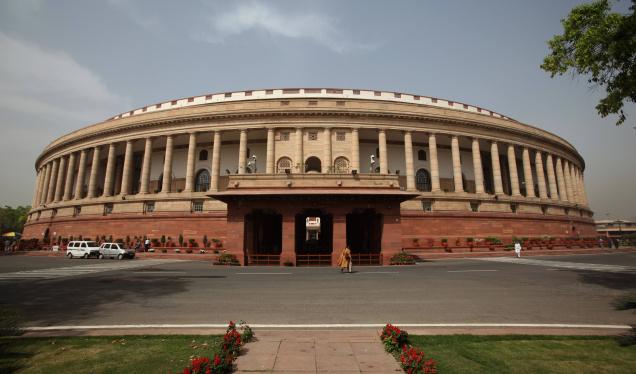
The top developments are that the current legislative agenda includes 19 Bills that are presently pending in Parliament for consideration and passing and 14 new Bills are also proposed to be introduced, from which one bill be taken up for consideration and passing too. The two Bills that will be withdrawn are the Drugs and Cosmetics (Amendment) Bill, 2013 and the Atomic Energy (Amendment) Bill, 1992.
Bills pending in Parliament for consideration and passing are-
The Constitution (122ndAmendment) (GST) Bill, 2014-
In May 2015, this bill was passed by Lok Sabha. Through this, goods will be taxed by Centre and services by States. Only AIADMK voted against the Bill with 37 votes. Being a Constitution Amendment Bill, it is required to be passed by both the houses with the 2/3rd majority.
The Real Estate (Regulation and Development) BilI, 2013-
The Union Cabinet, chaired by the Prime Minister gave its approval to the Bill in April this year. The Bill establishes State level regulatory authorities called Real Estate Regulatory Authorities, to regulate transactions between buyers and promoters of residential real estate projects. For appeals from these Regulatory Authorities, it establishes state level tribunals called Real Estate Appellate Tribunals.
The Human Immunodeficiency Virus and Acquired Immune Deficiency Syndrome (Prevention and Control) Bill, 2014-
Bill seeks to prevent and control the spread of HIV and AIDS, prohibits discrimination against persons with HIV and AIDS, provides for informed consent and confidentiality with regard to their treatment, places obligations on establishments to safeguard their rights, and creates mechanisms for redressing their complaints. It recommends monetary fine up to Rs. 10,000 and also two years of imprisonment for those found guilty of spreading hatred against people affected by HIV/AIDS. It also says that anti-retroviral therapy (ART) will be provided to all patients by the government as long as possible.
The Mental Health Care Bill, 2013-
It repeals the Mental Health Act, 1987, as the Act does not adequately protect the rights of persons with mental illness nor promote their access to mental health care. The Bill provides for the right to access mental healthcare and treatment from services run or funded by the government.
The Electricity (Amendment) Bill, 2014-
This bill amends the Electricity Act, 2003. It seeks to segregate the distribution network business and the electricity supply business, and introduce multiple supply licensees in the market.
The Child Labour (Prohibition and Regulation) Amendment Bill, 2012-
In May this year, the Union Cabinet gave its approval to official amendments to the Child Labour (Prohibition & Regulation) Amendment Bill, 2012. The Bill amends the Child Labour (Prohibition and Regulation) Act, 1986, which basically prohibits employing children as labor in 18 occupations and 65 processes.
The Bill also adds a new category i.e., “adolescent”: a person between 14-18 years of age. The Bill prohibits employment of adolescents in hazardous occupations.
The High Court and the Supreme Court Judges (Salaries and Conditions of Service) Amendment Bill, 2015-
The Bill amends the High Court Judges (Salaries and Conditions of Service) Act, 1954 and Supreme Court Judges (Salaries and Conditions of Service) Act, 1958. The Union Cabinet had approved the proposal to amend the Act in August this year.
The Commercial Courts, Commercial Division and Commercial Appellate Division of High Courts Bill, 2015-
The Bill enables the creation of commercial divisions in high courts, and commercial courts at the district level.
The Prevention of Corruption (Amendment) Bill, 2013-
The Bill amends the Prevention of Corruption Act, 1988. It defines criminal misconduct to cover only misappropriation of property and possession of disproportionate assets.
The Bill modifies the definitions and penalties for offences related to taking a bribe, being a habitual offender and abetting an offence.
The Anti-Hijacking Bill, 2014-
The Bill seeks to repeal The Anti-Hijacking Act, 1982.
The Bill includes several acts within the definition of hijacking including: (i) attempt and abetment of hijacking; (ii) making a credible threat to commit hijacking; (iii) organizing or directing others to commit hijacking; (iv) agreeing with another to commit the offence, and acting on the agreement; etc. It makes hijacking and the related offences shall be extraditable.
The Repealing and Amending (Third) Bill, 2015-
The Bill seeks to repeal 295 Acts and make minor amendments to the Sexual Harassment of Women at the Work Place (Prevention, Prohibition and Redressal) Act, 2013, and the Governors (Emoluments, Allowances and Privileges) Amendment Act, 2014.The Scheduled Castes and the Scheduled Tribes (Prevention of Atrocities) Amendment Bill, 2014. The Bill was passed by Lok Sabha amid boycott of the house by opposition parties. It replaces the Scheduled Castes and Scheduled Tribes (Prevention of Atrocities) Amendment Ordinance, 2014 and seeks to amend the Scheduled Castes and the Scheduled Tribes (Prevention of Atrocities) Act, 1989.
Also, new offences have been added that are mostly related to Dignity –Offences, atrocities against women, land and housing, franchise and untouchability in public sphere. Now, abusing SCs or STs by caste name in public, trying to promote feelings of ill-will against SCs or STs or disrespecting any deceased person held in high esteem, and imposing or threatening a social or economic boycott are offences under the amended Act.
Hit next for the reading on further about the proposed legislation!

